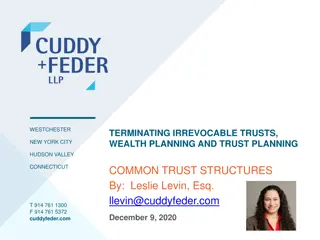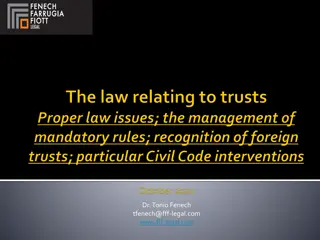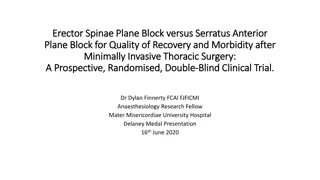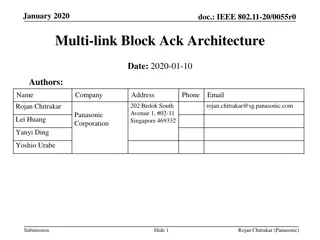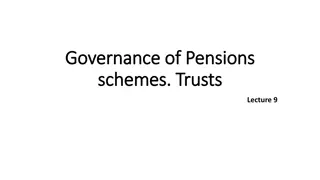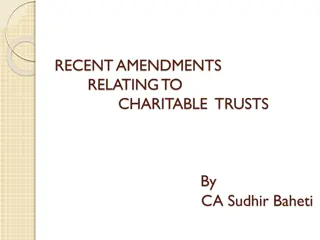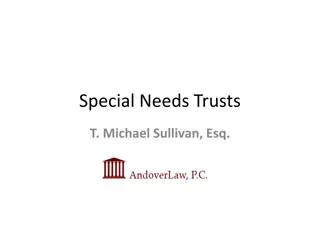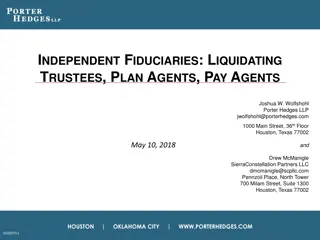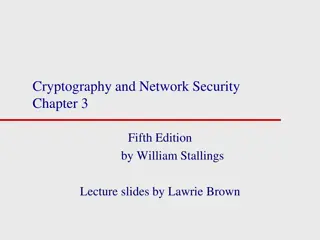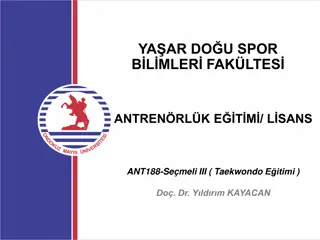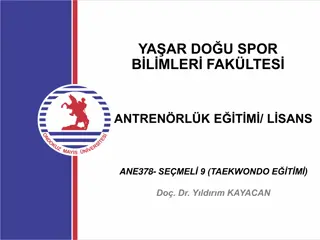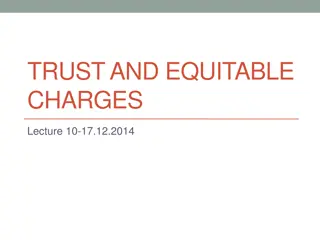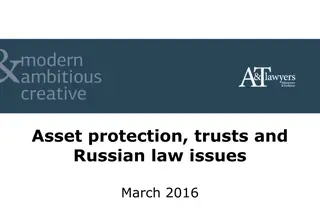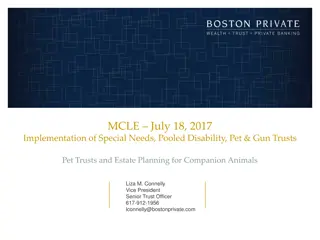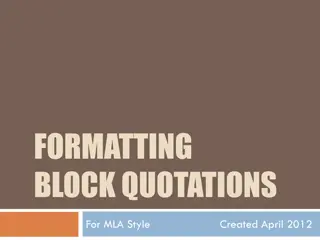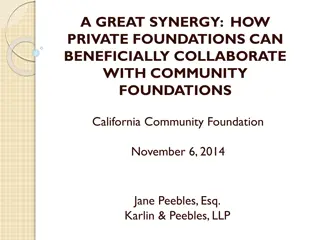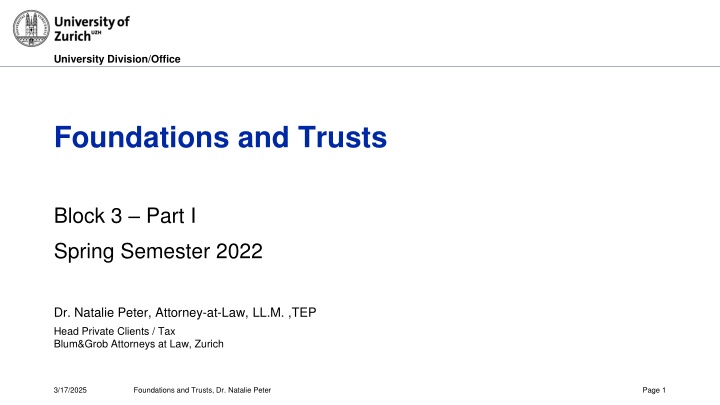
Foundations and Trusts: Key Considerations in Swiss Law
This academic material delves into the intricacies of foundations and trusts in the context of Swiss law. Presented by Dr. Natalie Peter, an Attorney-at-Law, it covers essential topics such as the use of trusts and foundations in practice, managing trusts in Switzerland, taxation perspectives, and the differences between common law and civil law countries regarding inheritance rights and legal reserves. The comparison between common law and civil law customs provides valuable insights into estate planning strategies within these legal frameworks.
Download Presentation

Please find below an Image/Link to download the presentation.
The content on the website is provided AS IS for your information and personal use only. It may not be sold, licensed, or shared on other websites without obtaining consent from the author. If you encounter any issues during the download, it is possible that the publisher has removed the file from their server.
You are allowed to download the files provided on this website for personal or commercial use, subject to the condition that they are used lawfully. All files are the property of their respective owners.
The content on the website is provided AS IS for your information and personal use only. It may not be sold, licensed, or shared on other websites without obtaining consent from the author.
E N D
Presentation Transcript
University Division/Office Foundations and Trusts Block 3 Part I Spring Semester 2022 Dr. Natalie Peter, Attorney-at-Law, LL.M. ,TEP Head Private Clients / Tax Blum&Grob Attorneys at Law, Zurich 3/17/2025 Foundations and Trusts, Dr. Natalie Peter Page 1
University Division/Office Table of Contents A. Selected issues B. Use of Trusts and Foundations in Practice C. Managing Trusts in Switzerland (Regulation) 3/17/2025 Foundations and Trusts, Dr. Natalie Peter Page 2
University Division/Office Table of Contents D. Taxation of Foundations from a Swiss perspective E. Taxation of Trusts from a Swiss perspective F. Application of Double Taxation Agreements 3/17/2025 Foundations and Trusts, Dr. Natalie Peter Page 3
University Division/Office Table of Contents A. Selected Issues I. Tradition and customs in common law vs civil law countries II. Information Rights Heirs vs. Beneficiaries III. Pass-Through IV. Anti-Forced Heirship Provisions V. Transfer of Swiss Property (Lex Koller) VI. Insolvency Issues 3/17/2025 Foundations and Trusts, Dr. Natalie Peter Page 4
University Division/Office I. Tradition and customs in common law vs civil law countries Common Law: o Legal reserve (forced heirship) typically unknown o Providing for a family stronger than for individual heir o Hardly any Code provisions very flexible for tailor-made solutions o Information rights limited to information relevant Civil Law: o Legal reserve (varies from jurisdiction to jurisdiction) o Providing for individual heir more important than for family o Various Code provisions to be obeyed less flexible for tailor-made solutions o Right to information important 3/17/2025 Foundations and Trusts, Dr. Natalie Peter Page 5
University Division/Office I. Tradition and customs in common law vs civil law countries Example o Mr Smith, resident in the US, may transfer his entire estate to a trust Mr M ller, resident in CH, is subject to strict forced heirship rules o Mr Smith may exclude certain legal heirs in his trust, a can include strict distribution provisions Mr M ller must respect provisions of the marital regime, inheritance rules and other provisions on the transfer to assets into a structure 3/17/2025 Foundations and Trusts, Dr. Natalie Peter Page 6
University Division/Office II. Information Rights Heirs vs. Beneficiaries Principles o Heirs have information rights on documents and transactions of the deceased, they have also rights on beneficial ownerships of the deceased o Heirs of settlor enjoy the same information rights from trustee as the settlor during his lifetime o Beneficiaries information rights depend on the applicable law and the trust documents typically limited to information evident and/or relevant o Swiss foundation law does not provide for information rights 3/17/2025 Foundations and Trusts, Dr. Natalie Peter Page 7
University Division/Office III. Pass-Through While a look-through or pass-through approach is often taken for tax purposes based on an economical view (Substance-over-Form), Courts are more hesitant to a pass-through for civil law purposes o Rybolovlev vs. Rybolovleva o High Court Schaffhausen, 10/2003/11 dated 30 July 2004 o High Cour Nidwalden, AbR 2006/07 Nr. 2, dated 5 July 2007 o Federal Supreme Court, 5A_498/2007/bnm, dated 28 February 2008 3/17/2025 Foundations and Trusts, Dr. Natalie Peter Page 8
University Division/Office III. Pass-Through High Court Schaffhausen, 10/2003/11, 30 July 2004 o The children of W have legal claim (donation) against their father W. He tries avoiding payment. The children caused seizure of funds held by a Lichtenstein foundation founded by W. The foundation appealed the seizure in the following debt collection proceeding. o The Court held the following: A foreign foundation is a company within the meaning of IPL Typically recognition of a foundation (principle of incorporation) In case of abuse foundation is disregarded as an exception. The power to change the statutes and by-laws is however not sufficient alone for a pass-through 3/17/2025 Foundations and Trusts, Dr. Natalie Peter Page 9
University Division/Office III. Pass-Through High Court Schaffhausen, 10/2003/11, 30 July 2004 o The Court held the following: question of a pass-through liability of a foundation organised and administered under the law of Liechtenstein is subject to Liechtenstein law void sham structure may be justified if the founder intended to continue to use the foundation assets for his own benefit and not in the sense of the stated foundation purpose. founder established the foundation primarily to deprive his children of the assets the intent of W contradicted the stated charitable foundation purpose thus, a pass-through was permissible under Liechtenstein law 3/17/2025 Foundations and Trusts, Dr. Natalie Peter Page 10
University Division/Office IV. Anti-Forced Heirship Provisions Article 471 CC o Legal portion of spouse of the estate legal reserve o Legal portion of descendants of the estate legal reserve 3/8; if no surviving spouse 1/1 - legal reserve (under revision) 3/17/2025 Foundations and Trusts, Dr. Natalie Peter Page 11
University Division/Office IV. Anti-Forced Heirship Provisions Article 527 Swiss CC: o disposal of assets within 5 years of death o disposal of assets at any time which minimizes, or disregards legal reserve is taken into consideration when legal reserve is determined; recipient can be forced to pay / transfer back any assets received 3/17/2025 Foundations and Trusts, Dr. Natalie Peter Page 12
University Division/Office IV. Anti-Forced Heirship Provisions non-exhaustive list of such jurisdiction: Bahamas Barbados Bermuda BVI Cayman Islands Cyprus Dubai Guernsey / Jersey / Isle of Man Mauritius Singapore o 3/17/2025 Foundations and Trusts, Dr. Natalie Peter Page 13
University Division/Office IV. Anti-Forced Heirship Provisions attacking a trust or executing a foreign decision in its home jurisdiction is mostly an uphill-battle o If funds are held in a Swiss bank heirs/beneficiaries may be able to seize the assets pass-through approach o 3/17/2025 Foundations and Trusts, Dr. Natalie Peter Page 14
University Division/Office V. Transfer of Swiss Property (Lex Koller) Legal Basis o Art. 4 HTC transfer of real property is not governed by HTC o Art. 11 para. 3 lit. d HTC right to receive property if trustee mixed it with his own assets are sold it (Art. 149d Abs. 3 IPRG) o Art. 12 HTC right of trustee to publicly record trusteeship (Art. 149d IPRG) o Art. 15 para. 1 lit. d HTC - application of conflict of law rules lex fori o Art. 99 Abs. 1 IPL - lex rei sitae for Swiss properties 3/17/2025 Foundations and Trusts, Dr. Natalie Peter Page 15
University Division/Office V. Transfer of Swiss Property (Lex Koller) Legal Basis o Art. 149d par. 1 IPL registration of trustee in land register o Art. 149d par. 3 IPL bona fide third party is protected if trusteeship is not mentioned o Art. 58, Art. 67, Art. 128 and Art. 137 - Ordinance to land register (GBV) o Guidance of Federal Land Registry and Real Estate Law Office o Lex Koller o Bundesgesetz ber das b uerliche Bodenrecht (BGBB) 3/17/2025 Foundations and Trusts, Dr. Natalie Peter Page 16
University Division/Office V. Transfer of Swiss Property (Lex Koller) Transfer follows Swiss law (Art. 4, 15 HTC, Art. 99 par. 1 IPL) o Commitment and registration in land regsiter o Principle of compulsory registration Obligation: dedication as unilateral act sui generis (trust statute9 Registration of obligation by settlor with consent of trustee 3/17/2025 Foundations and Trusts, Dr. Natalie Peter Page 17
University Division/Office V. Transfer of Swiss Property (Lex Koller) Notarial Deed o Trust has been settled validly according to applicable (foreign) law o Person being registered is the trusteee (trust itself has no legal entity) o Property to be transferred has been dedicated to the trust assets o Trust Deed needs to be presented in case dedication is part of it 3/17/2025 Foundations and Trusts, Dr. Natalie Peter Page 18
University Division/Office V. Transfer of Swiss Property (Lex Koller) Transfer from Trustee to Trustee (Art. 67 par. 1 lit. d GBV) o Change of ownership in case of change of trustee o Notarial Deed signed by leaving trustee and/or new trustee 3/17/2025 Foundations and Trusts, Dr. Natalie Peter Page 19
University Division/Office V. Transfer of Swiss Property (Lex Koller) Lex Koller o Property covered incluses family homes, condominiums and apartment buildings o Commercial property is in prinicple not covered o Holiday homes may be purchased in various Cantons subject to official approval 3/17/2025 Foundations and Trusts, Dr. Natalie Peter Page 20
University Division/Office V. Transfer of Swiss Property (Lex Koller) Lex Koller no approval is needed o Legal heirs (non-Swiss citizens) o Acquisition by parents in direct line or spouses 3/17/2025 Foundations and Trusts, Dr. Natalie Peter Page 21
University Division/Office V. Transfer of Swiss Property (Lex Koller) Lex Koller purchase is not possible for real estate companies o With statutory seat abroad o With statutory seat in CH, but controlling majority of shareholders are foreigners resident outside CH 3/17/2025 Foundations and Trusts, Dr. Natalie Peter Page 22
University Division/Office V. Transfer of Swiss Property (Lex Koller) Transfer of property to a Trust No legal basis Introduction of Art. 58, 67, 128 and 137 GBV as a result of the ratification of HTC Guidance of Federal Land Registry and Real Estate Law Office 3/17/2025 Foundations and Trusts, Dr. Natalie Peter Page 23
University Division/Office V. Transfer of Swiss Property (Lex Koller) Transfer of property to a Trust possible if All beneficiaries are Swiss citizens (even if resident abroad) All trustees are Swiss citizens (even if resident abroad) o Corporate trustee as long as statutory seat in CH and controlling persons are Swiss citizens o Trust Deed excludes non-Swiss beneficiaries and trustees. o 3/17/2025 Foundations and Trusts, Dr. Natalie Peter Page 24
University Division/Office VI. Insolvency Issues Insolvency of Trustee Art. 248b SchKG ( Bankruptcy Code ): Segregation of Trust assets from personal assets of Trustee in case of an insolvency procedure over the trustee 3/17/2025 Foundations and Trusts, Dr. Natalie Peter Page 25
University Division/Office VI. Insolvency Issues Insolvency of Settlor Principle: Assets in Trust are separate from Settlor s assets provided the assets had been validly contributed to the trust o Swiss fraudulent conveyance claim (Paulianische Anfechtungsklage) if Settlor is a Swiss citizen o Look through sham trusts (Werner K. Rey case) 3/17/2025 Foundations and Trusts, Dr. Natalie Peter Page 26
University Division/Office Table of Contents B. Use of Trusts and Foundations in Practice I. Asset Protection II. Keeping Assets for the Family III. Avoiding Probate in common law jurisdictions IV. Tax Optimization Tool 3/17/2025 Foundations and Trusts, Dr. Natalie Peter Page 27
University Division/Office I. Asset Protection Trusts and Foundations may effectively shield a person's assets from future unexpected third-party litigation, punitive damages, unjustified claims or other threats to a person or family's wealth. These structures effectively disconnect assets from the current owner, thereby making it impossible for third parties to reach those assets. The settlor has ultimately no control to use or distribute the assets. All Asset Protection Trusts are irrevocable! Some US states provide for Asset Protection Trust. Offshore Trusts can be used as well 3/17/2025 Foundations and Trusts, Dr. Natalie Peter Page 28
University Division/Office II. Keeping Assets for the Family Parents want to make sure that their children do not inherit a lot of money while they are still young Parents want to make sure that their disabled child is provided for in case they pass away Family assets can be protected over several generations (prohibited in CH) Family Governance can be implemented in a structure Family Businesses are protected from unfriendly take-overs or partial sale by family members 3/17/2025 Foundations and Trusts, Dr. Natalie Peter Page 29
University Division/Office III. Avoiding Probate in common law jurisdictions Probate is the entire process of administering a dead person s estate. This involves organising the money, assets and possessions and distributing them as inheritance after paying any taxes and debts. If the deceased has left a Will, typically an executor has been appointed to administer the estate. The executor must apply for a Grant of Probate, a legal document that gives him the authority to deal with the deceased s property. 3/17/2025 Foundations and Trusts, Dr. Natalie Peter Page 30
University Division/Office III. Avoiding Probate in common law jurisdictions Probate ends once all taxes and debts have been paid and all inheritance passed on. Probate takes about a year for most estates. In complex or sizable estates, it can even take longer. International probate can be more complicated and usually takes between six months and two years. 3/17/2025 Foundations and Trusts, Dr. Natalie Peter Page 31
University Division/Office III. Avoiding Probate in common law jurisdictions In the US a Living Trust is settled during lifetime The trust is revocable and the trust deed contains rules as to what shall happen with the trust funds after the settlor passed away Benefits of a living trust o The trustee can immediately take care of the funds after the settlor passed, e.g. paying for funeral costs and distributing property to heirs, without having to wait on the probate judge. o A living trust is less likely to be challenged in court than a simple will o A will is a public document, anyone can get a copy of it. A living trust is totally private not copies of the trust deed can be received 3/17/2025 Foundations and Trusts, Dr. Natalie Peter Page 32
University Division/Office IV. Tax Optimization USA o the tax exempt threshhold for estate taxes is currently USD 11.58 mln o By transferring USD 11.58 to a trust, this exemption can be used as this threshhold can be reduced in the future Germany o The German inheritance tax between parents and children is up to 30% and up to 50% for non-related heirs. The tax exempt amount for children is Euro 400 000 only o By transferring funds into a foundation, a one-time tax applies 3/17/2025 Foundations and Trusts, Dr. Natalie Peter Page 33
University Division/Office Table of Contents C. Managing Trusts in Switzerland (Regulation) I. Regulatory Development in Switzerland II. Anti-Money Laundering Provisions III. FINIA / FINSA 3/17/2025 Foundations and Trusts, Dr. Natalie Peter Page 34
University Division/Office I. Regulatory Development in Switzerland Trusts and typically Liechtenstein Foundations had been used for decades, unfortunately often for tax evasion Bad reputation to be fight against Beneficial owner identification rules Bank forms A, T, and S introduced o Terme beneficial owner has been broadened over the years, today includes discretionary beneficiaries o Sometimes mistaken with controlling person o 3/17/2025 Foundations and Trusts, Dr. Natalie Peter Page 35
University Division/Office I. Regulatory Development in Switzerland Regulations shall prevent money laundering and terrorist financing Application of international standards of Financial Action Task Fore (FATF) Revised Federal Act on Money Laundering entered into force on 1.1.2020 o Extending due diligence obligations to advisors, including trustees o Periodic checking and updating of client data o Duty to report to Money Laundering Reporting Office Switzerland (MROS) FINIA / FINSA entered into force on 1.1.2020 3/17/2025 Foundations and Trusts, Dr. Natalie Peter Page 36
University Division/Office II. Anti-Money Laundering Provisions Definition of Money Laundering (Art. 305 bis para. 1 PC) Anybody committing an act capable of preventing the investigation into the origin of, the discovery of or the seizure of assets that as he, she, or it knows or has to assume originate from a crime, may be punished by imprisonment or by a fine. 3/17/2025 Foundations and Trusts, Dr. Natalie Peter Page 37
University Division/Office II. Anti-Money Laundering Provisions Predicate offences o anything defined as a crime under Swiss law o drug trafficking, fraud, theft, embezzlement, human trafficking, bribery, product piracy, counterfeiting of goods, insider trading or share manipulation. 3/17/2025 Foundations and Trusts, Dr. Natalie Peter Page 38
University Division/Office II. Anti-Money Laundering Provisions Predicate offences o Since 1.1.2016 severe violation of tax tax evasion qualifies as tax fraud under Swiss tax law - forging or (substantially) falsified documents that have a qualified evidentiary value (e.g., salary certificates, balance sheets or business records) with fraudulent intent tax fraud must exceed the sum of CHF 300 000 per tax period. 3/17/2025 Foundations and Trusts, Dr. Natalie Peter Page 39
University Division/Office II. Anti-Money Laundering Provisions Predicate offences o Since 1.1.2016 severe violation of tax Tax offense committed abroad also qualify if the requirements of double incrimination is fulfilled tax offense committed abroad must be punishable under the foreign laws the foreign tax offense must fulfill the requirements for a qualified tax offense from a Swiss law perspective The non-declaration of a bank does not constitute a predicate offence 3/17/2025 Foundations and Trusts, Dr. Natalie Peter Page 40
University Division/Office II. Anti-Money Laundering Provisions Federal Anti-Money Laundering Act o based on art. 305bis Swiss Penal Code (PC) o applies to financial intermediaries and governs the combating of money laundering and terrorist financing o ensures the exercise of due diligence in the conduct of financial transactions 3/17/2025 Foundations and Trusts, Dr. Natalie Peter Page 41
University Division/Office II. Anti-Money Laundering Provisions Anti-Money Laundering Ordinance o sets out the requirements for the professional practice of financial intermediation and the due diligence obligations and reporting duties Ordinance of financial intermediation FINMA Circular Financial Intermediation under AMLA 3/17/2025 Foundations and Trusts, Dr. Natalie Peter Page 42
University Division/Office II. Anti-Money Laundering Provisions The AMLA applies to any entity or natural person qualifying as a Financial Intermediary (FI) Art. 2 AMLA contains a (non-exhaustive) list of persons qualifying as FIs o banks, certain categories of fund managers, investment companies with variable capital, limited partnerships for collective capital investments, investment companies with fixed capital, asset managers within the meaning of the Collective Investment Schemes Act, certain categories of insurance providers, securities dealers, and casinos. 3/17/2025 Foundations and Trusts, Dr. Natalie Peter Page 43
University Division/Office II. Anti-Money Laundering Provisions Art. 2 AMLA contains a (non-exhaustive) list of persons qualifying as FIs o Non-banking sector: natural persons who, on a professional basis, accept or hold or deposit assets belonging to third parties or who assist in the investment or transfer of such assets o E.g. asset managers and credit institutions, inter alia those offering financial leasing, commodities traders, traders in banknotes, precious metals, as well as lawyers and notaries engaging in financial intermediation 3/17/2025 Foundations and Trusts, Dr. Natalie Peter Page 44
University Division/Office II. Anti-Money Laundering Provisions FI handling third party assets commercially if o gross profit equal to or in excess of CHF 50 000 per annum; o contractual arrangements with more than 20 parties per annum; o unlimited authority to dispose of third-party assets in excess of CHF 5; and o the conduct of transactions in excess of CHF 2 mln per annum 3/17/2025 Foundations and Trusts, Dr. Natalie Peter Page 45
University Division/Office II. Anti-Money Laundering Provisions Due Diligence Duties in connection with FI handling of third-party assets o verification of the identity of the contracting party o determination of the BO o establishment, monitoring and regular amendment of written client history o clarification of the economic background and purpose of a transaction or business relationship o appropriate record keeping of customer, BO and transaction data o implementation and maintenance of adequate internal organisational measures 3/17/2025 Foundations and Trusts, Dr. Natalie Peter Page 46
University Division/Office II. Anti-Money Laundering Provisions Suspicious activity report (SAR) to MROS o Duty to report if reasonable grounds for suspicion (art. 9 AMLA), or o Right to report in cases where there is merely a suspicion (art. 305ter par. 2 PC) - any observations that indicate that assets originate from a felony. bank must freeze the associated assets as soon as the reporting office informs that it is for-warding a report to a law enforcement authority account will remain frozen by the bank until the notification from the prosecuting authority arrives, but for a maximum of 5 working days 3/17/2025 Foundations and Trusts, Dr. Natalie Peter Page 47
University Division/Office II. Anti-Money Laundering Provisions Beneficial Owner o obligation to duly identify contractual party and to duly determine the beneficial owner (BO) o Agreement on the Swiss banks code of conduct with regard to the exercise of due diligence (CDB 20) a de facto minimal standard 3/17/2025 Foundations and Trusts, Dr. Natalie Peter Page 48
University Division/Office II. Anti-Money Laundering Provisions Beneficial Owner o A natural person or persons "who ultimately own or control a legal entity or arrangement, such as a company, a trust, or a foundation o Beneficial Owner of an account is identified on bank form A o Beneficiaries of Foundations and Trust are reported on Form S for foundations (Stiftungen) Form T for Trusts o Domiciliary Company (Sitzgesellschaft) beneficial owner must be identified individually 3/17/2025 Foundations and Trusts, Dr. Natalie Peter Page 49
University Division/Office III. FINIA / FINSA 1 January 2020 - the Swiss Financial Institutions Act (FINIA) and the Swiss Financial Services Act (FINSA) entered into force trustees operating in Switzerland are obliged to obtain an authorisation to carry out their activities Certain exemptions Objection o to create a uniform competitive landscape for financial intermediaries o to improve client protection 3/17/2025 Foundations and Trusts, Dr. Natalie Peter Page 50


